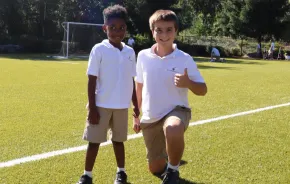
Editor's note: This article was sponsored by Bright Horizons
Asking your toddler or preschooler to say they’re sorry is like giving them a get-out-of-jail-free card, says Rachel Robertson, vice president of education and development at Bright Horizons Family Solutions.
"We don’t want children to learn they just have to say a few words, whether they’re sorry or not. Instead, we want to help them to take others’ perspective and develop empathy,” says Robertson. The way to teach skills like empathy takes effort but the great news is that children as young as 2 are receptive to learning these important life skills.
Take that moment when your preschooler won’t share her crayons with your toddler. One solution is to take some crayons, hand them to your toddler while saying to your preschooler, “We share in our family. Say you’re sorry!”
Yet this solution is short-term, says Robertson, and just teaches children that saying sorry will get them out of a situation. The opportunity to teach perspective and empathy is missed.
Robertson encourages parents to intentionally provide opportunities to develop and model life skills to young children. Below she unpacks ways to teach several life skills:
Teach perspective-taking, collaboration and empathy
Children naturally practice these skills during imaginary play. Observe their imaginary play and you’ll see wonderful examples of communication, negotiation, creativity and collaboration. Join in, but be careful you don’t take over. If your toddler and preschooler are arguing over crayons, take them through the mental process an adult would undergo internally and give your kids the opportunity to solve their problem.
Say, “I see Megan has all the crayons. I think Jack’s sad because he’s crying. Megan, how do you think Jack feels? What do you think we should do to help Jack?”
Help them be learners and thinkers
One of the ways this happens in early childhood is by asking open-ended questions that don't have right or wrong answers. When they ask you a question, ask them to consider the answers. Ask them, “How does the sky make rain? What do you think?” Then be a co-researcher, exploring the answer together. (A good cure for when your child replies "I don’t know," is to say, “Tell me about something you want to tell me about.")
Our goal should be to have their interests drive the conversation.
There’s a great video by the Rollins Center for Language & Literacy that addresses the importance of having meaningful conversations with children. In the video, a girl says, “Ask us what we think, not what color a banana is!” Our goal should be to have their interests drive the conversation. Or ask them for a solution and let them try it out even if you know it won’t work. If they want to beat an egg with a spoon when you know using a fork works better, let them try and learn that for themselves. Or when something is a little too challenging, model it while including them in the parts they can participate in, like holding the fork with you while you whisk.
Practice executive functioning skills
Executive function skills are foundational to all other life and learning skills: working memory, inhibitory control, cognitive flexibility, working together to help people attend to tasks, behavior control, thinking flexibly, planning ahead and working with others. The Center on the Developing Child at Harvard University uses the term “air-traffic controller of the brain” to describe their joint function. These are sophisticated skills that take years to develop, but they begin to develop early.
Parents can provide intentional opportunities to develop these skills. For example, before heading to the store, walk them through the game plan for the store visit first. Say, “Today we’re only buying food and we’re not visiting the toy aisle or buying toys. What would you like to help me with? Holding the list or choosing the apples?” When there’s a long wait in the line, instead of handing over your phone to occupy them, initiate a game of Simon Says. Of course, some days everyone is tired, tantrums will erupt, and phone time happens. These are complex skills and children develop them slowly. It’s important to support the development of these skills, but don’t expect them to be perfect.
Of course, notes Robertson, what children need most are strong attachments and consistent, nurturing relationships. “It’s not about leaving children to figure it all out on their own or about helping them at every step. It’s about finding the right balance to provide support, without doing for them what they can do for themselves. Parents can resist solving issues for children, and instead prompt them to find solutions while providing encouragement and helping when needed,” says Robertson.
Sponsored by:












